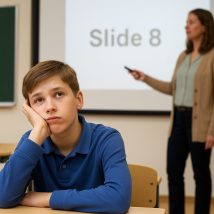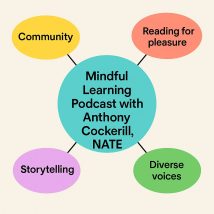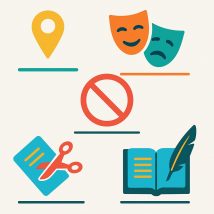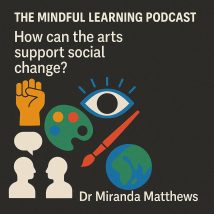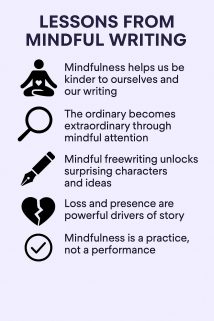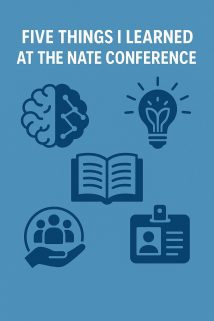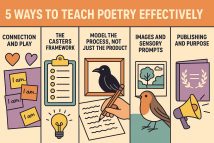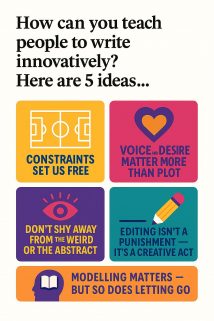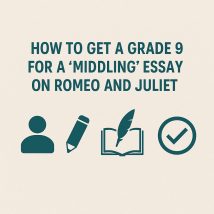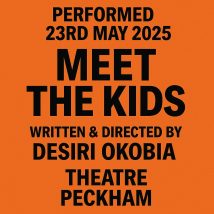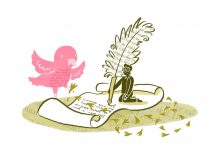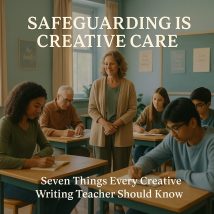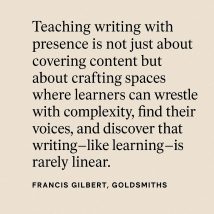for teachers
Here I post a variety of material for teachers. You can reorder the table to aid your search by clicking any of the headings.
-
Five Things I Learnt from Running My Workshop at Ecology in the Art Curriculum event
Begin with breathing, end with agency Our recent CPD, run by the British Ecological Society, the Centre for Arts and Learning, the MA in Art and Ecology, and the PGCE Art and Design programme at Goldsmiths, brought together teachers, artists, and ecologists to explore how mindfulness and creative pedagogy can help students reconnect with the natural world. We began simply, with a 7–11 breathing pattern, in for seven, out for eleven, and the room shifted. Teachers found themselves calmer, more attentive, and ready to imagine. A guided visualisation led participants into remembered or imagined parks, awakening ecological awareness. One delegate described how “thinking about ecology in architecture always meant thinking about care, what lives around our buildings.” From that mindful pause grew dialogue, drawing, and story. Participants wrote, sketched, and mapped experiences of safety, resilience, and belonging. Multimodality helped everyone find a voice, whether through words, images, or textures, and teachers began to see how pupils could express complex feelings about public space. Stories carried particular weight. The tale of the cracked pot, a vessel that leaks water and nurtures flowers on its path, became a metaphor for resilience and repair. Teachers shared their own narratives of strength and imperfection, connecting personal reflection with community action. By the end, delegates were planning how to adapt these approaches in their own settings, mapping safe routes with pupils, collaborating with councils, and gathering data to balance perception and reality. Change, we realised, does not arrive as a slogan but travels through networks of small, mindful acts. As I suggest in The Mindful Creative Writing Teacher, small rituals of attention such as breathing, noticing, and creating build agency. They help us move from reflection to action, from seeing to doing, with care.
-
Five Things English Teachers Can Teach Us About Reading, Writing, and Living
I recorded this episode of the Mindful Learning Podcast with Anthony Cockerill, director of the National Association for the Teaching of English (NATE), because I believe English teachers have so much to teach us beyond the classroom. Our conversation was a chance to explore what reading, writing, and language mean for all of us as human beings, not just for students in schools. Anthony spoke passionately about the life-changing power of reading for pleasure, the way writing can help us respond to and reflect on life, and the importance of valuing every community’s language. He reminded me that stories shape who we are and that teaching thrives best in community, not in isolation. These are not just classroom lessons — they are life lessons. I wanted to share this podcast because, at a time when education is often framed in narrow, utilitarian terms, we need to remember the broader value of English. Reading, writing, and language are not luxuries; they are ways of being human, of building empathy, resilience, and imagination. Listen to the full conversation and read the blog here: 👉 https://www.francisgilbert.co.uk/2025/09/five-things-english-teachers-can-teach-us-about-reading-writing-and-living/
-
Five Ways Arts Practice Can Facilitate Social Change
🎙️ I wrote this blog and recorded this Mindful Learning Podcast episode because I believe the arts are a powerful, often overlooked force for real social change. In conversation with Dr Miranda Matthews, we explore how creative practice can help us respond to the climate crisis, amplify marginalised voices, and transform education from the ground up. We talk about art as participation, not performance; about murals in schools and selkie suits in seal sanctuaries; and about how storytelling and small actions ripple outwards. 🖼️ This one’s for teachers, artists, students—and anyone wondering how creativity can make a difference. 👉 Read the blog and listen to the podcast: https://www.francisgilbert.co.uk/2025/07/five-ways-arts-practice-can-facilitate-social-change If you’re reading this on Instagram, please paste the link into your browser to access the full article and audio. #MindfulLearningPodcast #ArtsForChange #CreativeEducation #FrancisGilbert #MirandaMatthews #EcologiesInPractice #Goldsmiths #ArtsAndLearning #ClimateJustice #CriticalPedagogy #StoryOfChange
-
Eight Transformative Moments from Our Reciprocal Teaching Day at Goldsmiths
🖋️ “It didn’t have to be clever. It just had to be true.” At a recent MA Creative Writing and Education sharing day, alumna Maryam Ahmadi led a powerful storytelling session exploring how fables can carry emotional and moral truths that essays and arguments often can’t. The bold linocut-style image here captures the spirit of the session: a teacher and group of students surrounded by symbols of learning and connection—a heart, a lightbulb, a book, and leaves. A chalkboard shows the simplest of equations: 1 + 1, reminding us that real learning is reciprocal. When we share stories, we’re not just transmitting knowledge—we’re transforming one another. Maryam began by reading Patrick and Flippa, a deceptively gentle children’s book about a lonely polar bear and a persistent penguin. The group then wrote their own fables, revealing themes of exile, regeneration, defiance, and hope. One participant wrote about a deer who could only speak in questions. Another told of a fish who forgot how to swim in clean water. These were not writing exercises. They were acts of quiet truth-telling. 💡 As one attendee put it: “It’s easier to say something difficult through the story of a fox. You get closer without flinching.” 📚 This workshop was part of the MA in Creative Writing and Education at Goldsmiths, University of London—a unique programme where writers become educators, and educators deepen their creative practice. 🔗 Find out about the MA: www.gold.ac.uk/pg/ma-creative-writing-education/ #MACreativeWritingAndEducation #GoldsmithsUniversity #StorytellingAsPedagogy #MindfulTeaching #Fables #CreativeWritingWorkshop #WritingToHeal #WritingToLearn #RadicalPedagogy #TeacherWriter #ReciprocalLearning
-
Five Reasons Why Mindfulness and Creative Writing Weave Together Well
What happens when we stop judging our writing—and simply listen? In this new blog post, I reflect on a recent workshop where writers used mindfulness to unlock voice, memory, and emotion. Together we explored how freewriting, object meditation, and mindful noticing can transform both what we write and how we feel about writing. Participants wrote about lipstick, tissue packets, Kindles—and discovered surprising characters, deep emotional truths, and stories of presence, loss, and joy. These moments reminded us that mindfulness is not about calming down—it’s about showing up. Drawing on my book The Mindful Creative Writing Teacher (Gilbert, 2025) and C. T. McCaw’s concept of “thick mindfulness,” I share five practical and poetic takeaways from the session. If you teach, write, or are simply curious about the link between awareness and creativity, this one’s for you. 💡 Read now and see how mindful writing can be radically freeing. #MindfulWriting #CreativeWritingTeacher #Freewriting #MindfulnessInEducation #WritersOfInstagram #AmWriting #WritingWorkshop #GoldsmithsUniversity #FrancisGilbert #WritingPrompt #MindfulLiving
-
Why English Teaching Still Matters: Insights from the 2025 NATE Conference
What does it mean to teach English with creativity, care, and courage in 2025? At this year’s NATE (National Association for the Teaching of English) conference, I joined a passionate group of teachers, academics, publishers, and educational innovators, some seasoned, others just starting out, to explore that very question. In this new blog post, I reflect on five powerful lessons from a day filled with poetic metaphors, Generation Alpha pedagogy, and mindful creative writing. From Clare Lawrence’s unforgettable lentil metaphor, to conversations about inclusive teaching for a post-2010 cohort, to the joyful solidarity of English educators nationwide: this was a conference where research met emotion, and practice met possibility. I also had the pleasure of leading a mindful creative writing workshop, inspired by my book The Mindful Creative Writing Teacher (Gilbert, 2025), and saw first-hand how freeing and transformative creative writing can be when rooted in reflection rather than performance. If you care about teaching English in ways that centre imagination, identity, and student voice, and want to explore this further, take a look at our MA in Creative Writing and Education at Goldsmiths. 🔗 MA info: https://www.gold.ac.uk/pg/ma-creative-writing-education/ #MindfulWriting #NATE2025 #CreativePedagogy #EnglishTeachers #TeacherCommunity #FrancisGilbert #MindfulCreativeWritingTeacher
-
Five things I’ve learnt training to be a mindfulness teacher
Earlier this year, I completed the Breathworks mindfulness teacher training—a rigorous and transformative journey rooted in compassion, embodiment, and lived experience. As part of the training, I led the Mindfulness for Stress course at Goldsmiths. It taught me something simple but profound: mindfulness isn’t something you explain. It’s something you do—together. The course invites people into a shared practice. Week by week, breath by breath, we learn not to escape stress but to meet it differently—with gentleness, attention, and care. I’ve seen how powerful it is when people turn toward themselves with kindness, not judgement. That shift—toward noticing, softening, and storytelling—transforms more than you might expect. Mindfulness isn’t about fixing or improving who you are. It’s about showing up for your experience, fully and kindly. This work has changed me. It’s helped me listen to my body, soften my inner voice, and meet difficulty with presence instead of resistance. If you’re curious about mindfulness, teaching it, or simply beginning to practise, I’d love to connect. Feel free to reach out—or just pause for a breath, right here. #Mindfulness #Breathworks #MindfulTeaching #Wellbeing #Embodiment #Compassion #FrancisGilbert #Goldsmiths #MindfulLiving
-
Let Poetry Jump Up: Five Key Ways to Teach Poetry Effectively
Let Poetry Jump Up: Five Powerful Ways to Teach Poetry I wrote this blog after attending a fantastic workshop led by the brilliant Fiona Plant, a warm and inspiring poetry educator. Her session was a powerful reminder of how poetry can create joy, connection, and confidence in the classroom. Fiona shared five inclusive, creative approaches that make poetry teaching feel fresh and purposeful—ranging from “I Am…” Post-it Poems and metaphor games to redacted newspaper poetry and the thoughtful use of sensory prompts. She also explored how to use the CASTERS lesson planning framework (which I developed) to bring intention, reflection, and creativity into every stage of the process. Most strikingly, Fiona urged us to model the process of writing—not just share polished work. When children see poetry unfold, with all its mess and magic, they begin to see themselves as writers too. You can find Fiona’s slides, activity ideas, and lots more in the full blog post on my website: 👉 www.francisgilbert.co.uk If you’d like to receive occasional curated updates about creative writing, education, and mindful teaching, you can sign up here: 👉 www.francisgilbert.co.uk/subscribecontact/ #PoetryTeaching #MindfulLearning #CreativeWriting #FrancisGilbert #CASTERSFramework #FionaPlant #TeacherInspiration #EduBlog
-
How can you teach people to write innovatively? Here are 5 ideas…
In this practical and thought-provoking article, I reflect on a brilliant CPD session led by writer and teacher Niall Bourke as part of the MACWE summer programme. Niall offered a masterclass in how to teach creative writing in ways that are emotionally rich, structurally sound, and genuinely original. The article outlines five key takeaways that challenge conventional, formulaic approaches to writing instruction. From the power of constraints to the centrality of voice and desire, from embracing the weird and abstract to viewing editing as a creative act, and finally to the importance of modelling without over-directing — these insights offer teachers and writers alike a fresh, flexible “toolkit” approach. Full of vivid examples, quotable gems, and links to wider reading, this piece is for anyone who believes that creative writing teaching should spark joy, courage, and clarity — not just box-ticking or genre mimicry.
-
🏅Model GCSE Essay on the Feud in Romeo and Juliet
If you’re teaching or studying Shakespeare’s ‘Romeo and Juliet’, you’ll know that essays about the family feud often hover around a Grade 4, 5 or 6—what examiners might call ‘middling’ or ‘competent’ responses. But with a few targeted improvements, these essays can be transformed into top-grade responses. I’ve updated one of my most popular blog posts to show exactly how to do this, paragraph by paragraph, with comments, grade 9 tips, and clear marking guidance for teachers and pupils alike. The key is to move beyond surface-level understanding and begin thinking like a literary analyst. That means really digging into Shakespeare’s language (AO2), showing a secure knowledge of the play and its themes (AO1), and crucially, thinking about why Shakespeare wrote what he did, and how his audience might have reacted (AO3). This is where the 5Ws strategy—Who, What, Where, When, Why—comes in. For example, instead of simply quoting the Prologue’s “ancient grudge” to describe the feud, a top-grade response will explore the word “ancient” in more depth. What does it suggest about tradition, time, and decay? What kind of audience would Shakespeare have been writing for, and why might he start with such a phrase? A Grade 9 student doesn’t just spot a quote—they zoom in on the language, explain the technique being used, and link it to Shakespeare’s bigger message about love, hate, and fate. I’ve used a visual symbol system in the new version of this post to make each part of the answer easier to teach and understand. A pencil icon stands for thoughtful analysis, a book and quill symbol represents literary and historical context, and a checkmark indicates where a pupil is showing Grade 8–9 thinking. I’ve also added a quiet but clear visual: a student figure at the centre of the learning, reminding us this is about developing real, mindful confidence—not just ticking boxes. This new breakdown works well for teachers modelling essays in class, for pupils revising independently, and for tutors looking for a clear teaching sequence. And if you’re looking for more structured support, I’d recommend my edition of the play, Romeo and Juliet: The Complete Play with Integrated Study Notes and Smart Translation—ideal for exploring language, structure and context in one place. For teachers, The Mindful English Teacher includes ideas for making literary analysis more inclusive, reflective, and emotionally aware. You can view the updated post and download the image resources now at francisgilbert.co.uk, or find the essay thread pinned to my socials. Let me know how you use it, and feel free to tag me with examples of Grade 9 insights from your own pupils!
-
Four Lessons from Meet the Kids at Theatre Peckham
In May, I had the great pleasure of watching a bold, moving and beautifully realised new play by Desiri Okobia, a former Creative Writing student from Goldsmiths. It was one of those evenings that reminded me exactly why this work matters. The play created space for young voices to lead, with care, depth, and honesty. It was a celebration of talent, courage, and creative education at its best — and a moment to witness the remarkable impact of a gifted writer-educator coming into her own.
-
Guerrilla CPD: Why Research-Informed Teacher Collaboration is the Future
I co-wrote “Guerrilla CPD” with Debbie Bogard to shine a light on the power of informal, grassroots teacher development. Debbie is a brilliant, research-informed practitioner working in Further Education, and collaborating with her was both inspiring and energising. Together, we drew on our shared belief that CPD works best when it emerges organically—through dialogue, creativity, and mutual respect—not when it’s imposed from above. Our article explores how we developed a playful, teacher-led CPD programme during the pandemic, rooted in the radical pedagogies of Freire, hooks, and Fanon. It was a time of crisis, but also one of possibility. We found that when teachers are given space to reflect, write, share ideas, and challenge dominant norms—particularly around curriculum content and delivery—something transformative can happen. Working with Debbie reminded me that the future of professional development lies in collaboration between FE and HE, between practice and theory, and between colleagues who trust and challenge each other. In a profession increasingly shaped by surveillance and accountability metrics, these kinds of informal, friendship-driven partnerships may be our best hope for genuine change.
-
The Mindful Creative Writing Teacher
This blog introduces The Mindful Creative Writing Teacher—my book for anyone teaching or facilitating creative writing, whether in schools, universities, prisons, or community spaces. Drawing on decades of experience, I offer a fresh, practical, and compassionate approach to teaching writing that blends mindfulness, creativity, and social justice. In the blog, I explain why I wrote the book: to move beyond rigid workshop models and embrace a more humane, dynamic, and inclusive pedagogy. The book is filled with real-life case studies, poems, hands-on activities, and reflective prompts designed to help you cultivate creativity, wellbeing, and critical thinking in your classroom. It’s for English teachers, creative writing tutors, and writers alike—especially those looking to empower diverse voices, support reluctant or neurodiverse learners, and find joy in their own writing again. You’ll find strategies for teaching storytelling, feedback, decolonisation, and multimodal writing, as well as guidance on developing your own mindful teaching identity. This blog offers a glimpse into the book’s ethos: writing not just as a craft to be perfected, but as a transformative act of attention, empathy, and expression. If you’re looking to teach writing in a way that’s more authentic, creative, and connected, this book—and blog—are for you.
-
7 Transformative Lessons from First Story’s Creative Writing Approach – A Goldsmiths Reflection
In this blog, I reflect on an inspiring session led by novelist and First Story writer-in-residence Pete Hobbs. Drawing on seventeen years of working with young writers, Pete shared a wealth of practical, playful exercises and a deeply inclusive pedagogy that reimagines creative writing as a space for experimentation, voice, and community. From evoking memory through sensory detail to empowering students to write in their own linguistic registers, his approach offers powerful strategies for educators at all levels. This post captures the session’s key takeaways—and celebrates the joyful, transformative possibilities of writing. It left me rethinking how I teach.
-
Seven Things Creative Writing Teachers Should Know About Safeguarding
I’m Francis Gilbert, and I’ve just published a vital blog post: Seven Things Creative Writing Teachers Should Know About Safeguarding. Drawing on a powerful masterclass led by Danja Sanovic at Goldsmiths, I reflect on how safeguarding isn’t just a legal box-tick but a deeply creative, relational act. Whether you’re teaching in schools, leading workshops in the community, or working with adults, this post offers clear, compassionate guidance. It’s essential reading for anyone using writing to reach vulnerable groups. Creativity thrives when everyone feels safe. Read the post and rethink how you hold your writing spaces.
-
6 Ways to Design Effective Creative Writing Lessons
I’ve written this blog to share some of the key insights from a recent seminar I delivered for students on the MA in Creative Writing and Education at Goldsmiths—and for anyone interested in designing more mindful, engaging creative writing lessons. Drawing on the CASTERS framework, James Nottingham’s “Learning Pit,” and ideas around publishing, reflection, and inclusive practice, the session offered practical strategies for teaching writing with presence, purpose, and care. Whether you’re a teacher, writer, or facilitator, this blog offers inspiration and guidance for creating lessons that challenge, connect, and empower. Find out more and join the conversation.
-
📎 CUT + COPY + TEACH: 5 Ways Uncreative Writing Will Turbocharge Your Teaching
As a writer and educator, I’ve long been fascinated by how creativity works in the classroom. In this blog, I explore Uncreative Writing, a radical teaching approach developed by Dr Cath Clover. Drawing on her powerful workshop at Goldsmiths, I show how copying, remixing, and reframing existing texts can spark critical thinking, accessibility, and genuine creative joy. Whether you’re teaching English, media, or any subject, this inclusive method helps students find their voice through found words.


